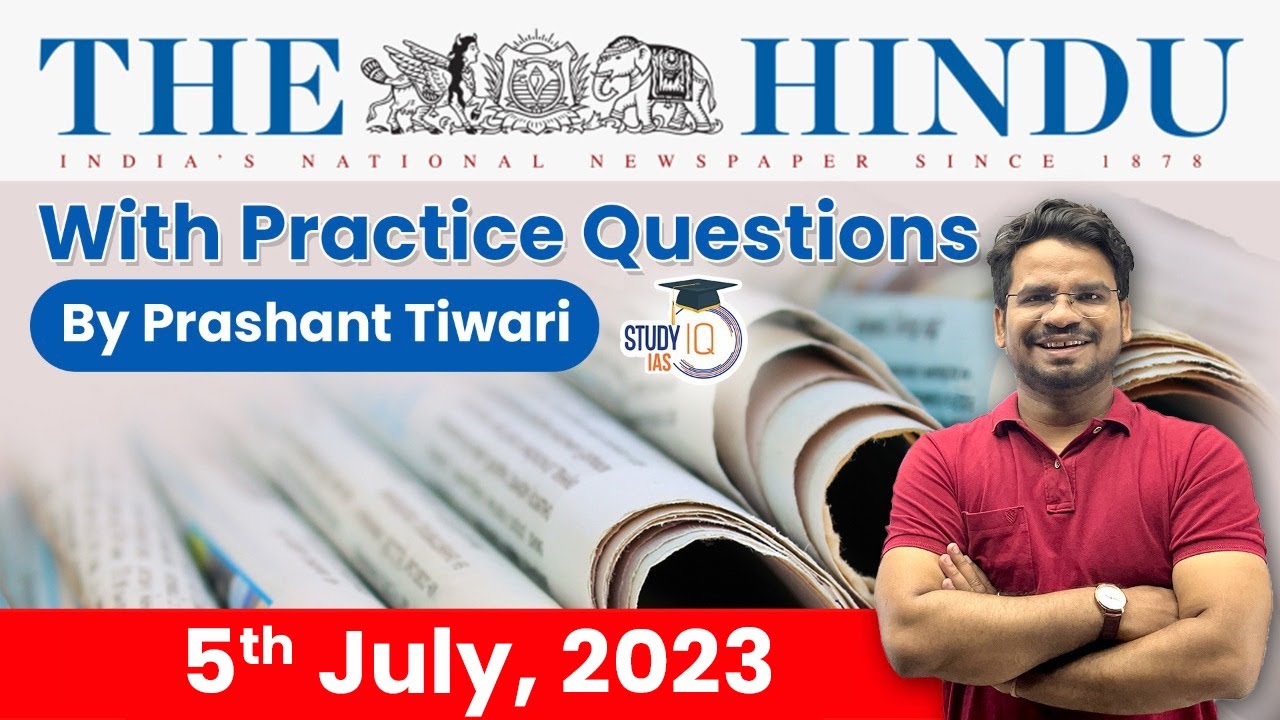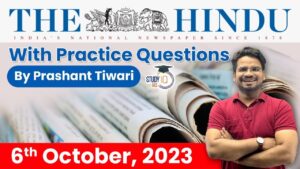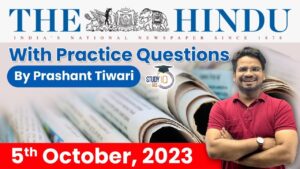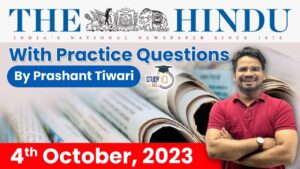The Hindu Newspaper Analysis for UPSC

The Hindu Newspaper Analysis 4 July 2023
- Indicating a lack of consensus, India stays out of statements on economic cooperation and on China’s Belt and Road Initiative, owing to projects in PoK; SCO calls for cooperation on digital payments and countering radicalization
- The formation of a “more representative” and multipolar world order is in the global interest, leaders of the Shanghai Cooperation Organisation said at a virtual summit chaired by Prime Minister Narendra Modi on Tuesday.
- The grouping’s decision to induct Iran as its ninth and latest member was one of a number of agreements signed at the summit.
- The SCO grouping now comprises China, India, Iran, Kazakhstan, Kyrgyzstan, Pakistan, Russia, Tajikistan and Uzbekistan.

- The Ministry of External Affairs on Tuesday summoned the High Commissioner of Canada, Cameron MacKay, and lodged a protest after campaigners for Khalistan put out posters targeting Indian diplomats in Canada.
- The top Canadian diplomat stationed in India was summoned after posters circulated online named two leading Indian diplomats stationed in Canada.

About
- Alluri Sitarama Raju (1897 – 1924) was an Indian revolutionary who waged an armed campaign against British colonial rule in India. He was nicknamed “Manyam Veerudu” (Hero of the Jungle) by local villagers for his heroic exploits.
- Activities:
- Born in present-day Andhra Pradesh, he became involved in anti-British activities in response to the 1882 Madras Forest Act
- The act restricted the free movement of Adivasis (tribal communities) in their forest habitats and prevented them from practising a traditional form of agriculture known as podu (shifting cultivation).
- Initially, Sitarama Raju, under the influence of Gandhi’s Non-cooperation movement, inspired thetribals to seek justice in the local panchayat courts and boycott the colonial courts.
- Led the Rampa Rebellion/Manyam Rebellion of 1922.
- Death: In 1924, Raju was taken into police custody, tied to a tree, and shot by public execution, effectively ending the armed rebellion.

- In India, the States mobilise altogether more than a third of total revenue, spend 60% of combined government expenditure, and have a share in government borrowing that is around 40%.
- An assessment of successive Finance Commissions since the Twelfth Finance Commission identified three States, i.e., Kerala, Punjab and West Bengal, as fiscally stressed States. The number of States that are now fiscally stressed has increased to seven.
- Revenue Deficit: It refers to the excess of government’s revenue expenditure over revenue receipts.
- Revenue Deficit = Revenue expenditure – Revenue receipts
- Fiscal Deficit: It is the gap between the government’s expenditure requirements and its receipts. This equals the money the government needs to borrow during the year. A surplus arises if receipts are more than expenditure.
- Fiscal Deficit = Total expenditure – (Revenue receipts + non-debt creating capital receipts).

- It is “extensively” antibiotic-resistant Pseudomonas aeruginosa bacteria found in multiple open containers of eye drops.
- Pseudomonas aeruginosa can cause infections in the blood, lungs (pneumonia), or other parts of the body after surgery.
- This strain, known for its high resistance to multiple antibiotics.
- It is found in soil, water and most human-made environments throughout the world. It thrives not only in normal atmospheres, but also in low-oxygen atmospheres, thus has colonised many natural and artificial environments.

- This got an approval in 2016 and was renumbered in the statute by Rajya Sabha as The Constitution (101st Amendment) Act, 2016.
- Its provisions:
- Central GST to cover Excise duty, Service tax etc, State GST to cover VAT, luxury tax etc.
- Integrated GST to cover inter-state trade. IGST per se is not a tax but a system to coordinate state and union taxes.
- GST Council
- Article 279A – GST Council to be formed by the President to administer & govern GST. It’s Chairman is Union Finance Minister of India with ministers nominated by the state governments as its members.
- The council is devised in such a way that the centre will have 1/3rd voting power and the states have 2/3rd.
- The decisions are taken by 3/4th majority.

- This got an approval in 2016 and was renumbered in the statute by Rajya Sabha as The Constitution (101st Amendment) Act, 2016.
- Its provisions:
- Central GST to cover Excise duty, Service tax etc, State GST to cover VAT, luxury tax etc.
- Integrated GST to cover inter-state trade. IGST per se is not a tax but a system to coordinate state and union taxes.
- GST Council
- Article 279A – GST Council to be formed by the President to administer & govern GST. It’s Chairman is Union Finance Minister of India with ministers nominated by the state governments as its members.
- The council is devised in such a way that the centre will have 1/3rd voting power and the states have 2/3rd.
- The decisions are taken by 3/4th majority.
- Section 69A of the IT Act, which sets out the power to issue blocking orders, was upheld by the Supreme Court in Shreya Singhal (2015) mainly on the ground that it came with adequate procedural safeguards.
- A definitive verdict from the Supreme Court may be needed to clarify both the rights and obligations of large media companies in relation to user-generated content.
- Reasonable Restrictions under Article 19: The State can impose restrictions on the freedom of speech and expression in the interests of
- Sovereignty And Integrity Of India,
- The Security Of The State,
- Friendly Relations With Foreign States,
- Public Order, Decency Or Morality, Or
- In Relation To Contempt Of Court,
- Defamation, Or
- Incitement To An Offence.
- Section 69 (A) of the Information Technology Act?
- It confers on the Central and State governments the power to issue directions “to intercept, monitor or decrypt any information generated, transmitted, received or stored in any computer resource”.
- The grounds on which these powers may be exercised are:
- In the interest of the sovereignty or integrity of India, defence of India, the security of the state.
- Friendly relations with foreign states.
- Public order, or for preventing incitement to the commission of any cognizable offence relating to these.
- For investigating any offence.
- Process of Blocking Internet Websites:
- Section 69A, for similar reasons and grounds (as stated above), enables the Centre to ask any agency of the government, or any intermediary, to block access to the public of any information generated, transmitted, received or stored or hosted on any computer resource.
- The term ‘intermediaries’ includes providers of telecom service, network service, Internet service and web hosting, besides search engines, online payment and auction sites, online marketplaces and cyber cafes.
- Any such request for blocking access must be based on reasons given in writing.

- The Karnataka government’s decision to convert the promised Anna Bhagya scheme to a direct benefit transfer temporarily has brought into focus the limits of a State government’s policy intervention on a crucial matter such as food security.
- Though the OMSS is meant for the sale of surplus stocks of wheat and rice at pre-determined prices through e-auctions in the open market, to improve the supply of foodgrains and control the price line, States have generally been allowed to purchase the surplus stock without e-auctions.
- The OMSS is now limited to accommodate small and marginal buyers and traders. The quantity that a bidder can purchase in a single bid ranges from 10-100 metric tonnes at present.


 The Hindu Newspaper Analysis 6 October 2...
The Hindu Newspaper Analysis 6 October 2...
 The Hindu Newspaper Analysis 5 October 2...
The Hindu Newspaper Analysis 5 October 2...
 The Hindu Newspaper Analysis 4 October 2...
The Hindu Newspaper Analysis 4 October 2...





















